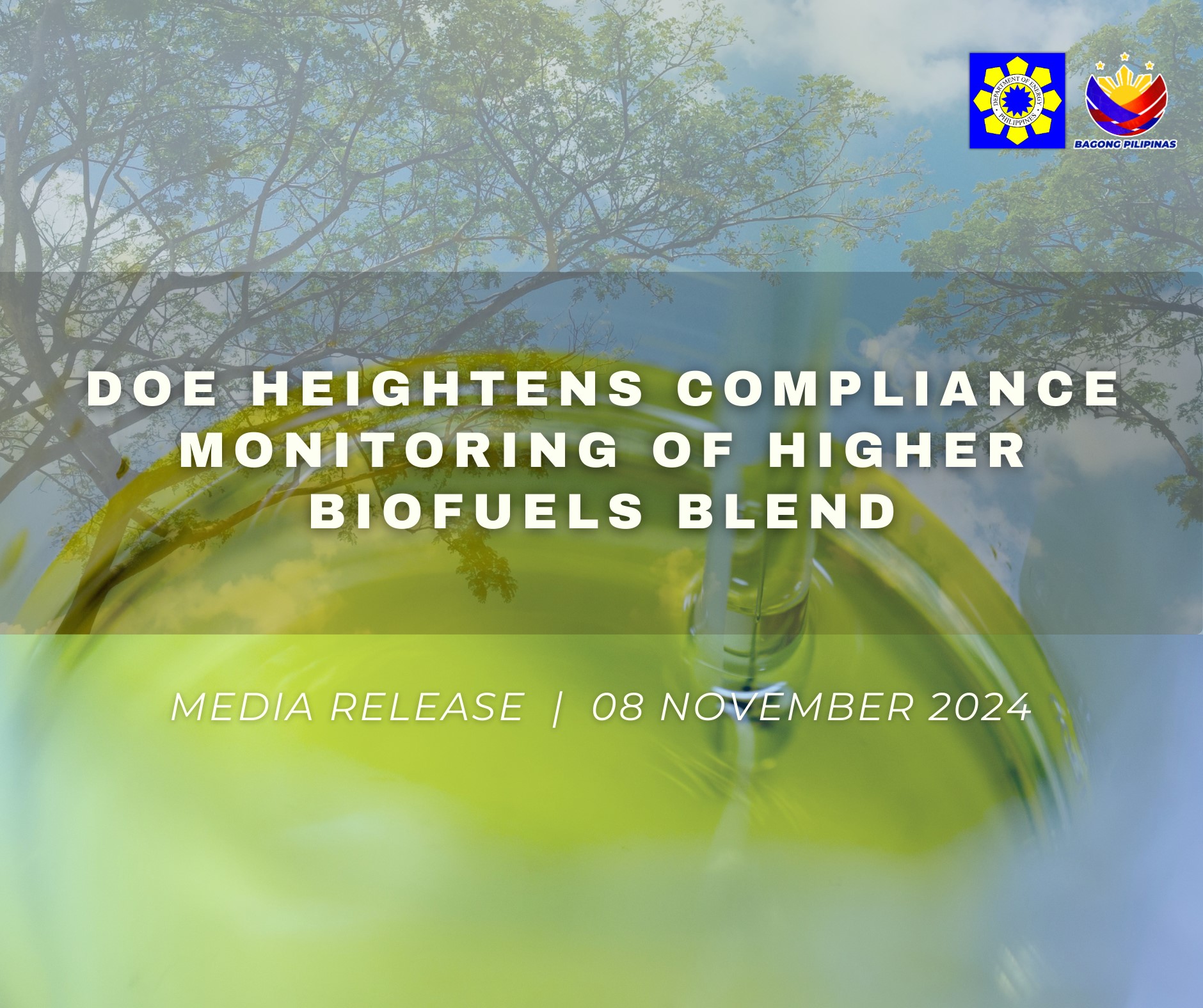One month after implementing the increased biodiesel blend, the Department of Energy (DOE), through the Oil Industry Management Bureau (OIMB), is intensifying its monitoring to ensure full compliance with the mandated 3% coconut methyl ester (CME) blend in all diesel fuel sold nationwide.
Undersecretary Alessandro O. Sales, who supervises the OIMB, emphasized the Department's commitment to ensuring a seamless transition to the higher biodiesel blend. “Oil companies have been given ample time to make this adjustment, and the OIMB will now conduct inspections at bulk depots to enforce compliance. Timely action at the depot level is crucial to maintaining an up-to-date and efficient fuel distribution chain,” Undersecretary Sales added.
In the coming weeks, the OIMB will gradually expand its inspections to include gasoline stations. In the meantime, the DOE reminds that non-compliance with the 3% biofuels blend will result in penalties of PhP200,000. Non-compliance is considered adulteration, while possession of biofuels blend that fails to meet the Philippine National Standards (PNS) requirements is also considered adulteration. For repeat offenders, a fine of PhP300,000 will be imposed, which may also lead to the revocation of their accreditation or registration.
Meanwhile, the DOE reports a notable avoidance in greenhouse gas (GHG) emissions, totaling 7,433 kilotons of carbon dioxide equivalent based on the April 2007 to September 2024 sales data from accredited local biofuels producers. This achievement highlights the positive impact of biofuels in mitigating GHG. In 2007, the country implemented a 1% biodiesel blend (B1) in compliance with the Biofuels Act adopted in 2006. The blend increased to 2% (B2) in 2011.
According to the United Nations Intergovernmental Panel on Climate Change (IPCC) Carbon Emission Calculator, the 3 percent CME blend would displace around 300 million liters of pure diesel annually. This translates to an estimated 1.11 percent reduction in carbon emissions, equating to around 298.2 kilotons of carbon dioxide. This reduction will play a crucial role in supporting the country’s Nationally Determined Contribution commitments to combat climate change
In addition to environmental benefits, biodiesel combustion produces fewer harmful emissions, such as particulate matter and sulfur dioxide compared to conventional diesel fuel. This improvement in air quality can lead to reduced respiratory problems and yield health benefits for the population.
Beyond environmental and health impacts, the DOE emphasizes the positive economic impact of biofuels. As of 2023, the local biofuels industry has generated 3,260 jobs, contributing to rural employment and income. These green jobs beneficiaries are also entitled to benefits under the Department of Labor and Employment's Social Amelioration and Welfare Program including death and maternity benefits, livelihood assistance, training and education assistance, social protection and welfare benefits, emergency assistance, and funding for socio-economic projects.
The increased CME blend is also expected to boost demand for coconut farmers, biodiesel producers, and other stakeholders in the coconut industry. The DOE estimates that around 900 million additional coconuts will be needed to produce the extra CME required to meet the mandated blend percentages, translating to approximately 100 to 120 million liters of additional CME supply.
Additionally, consumers stand to benefit from improved fuel efficiency and cost savings when using diesel with a higher CME blend. Extensive on-road testing with a 5% CME blend showed a 10% increase in mileage which is roughly equivalent to an additional 1 kilometer per liter. This efficiency means a vehicle that typically achieves 10 kilometers per liter on pure diesel will run for 11 kilometers with the 5% CME blend. The extra kilometer of mileage translates to approximately PhP5.00 in savings per liter, based on the 24 to 30 September 2024 average fuel pump price of PhP54.70 per liter.
The increase in biofuel blend is being implemented in phases, beginning with a 3 percent CME blend in all diesel fuel sold nationwide effective 01 October 2024. This blend will increase to 4 percent by 01 October 2025, and further to 5 percent by 01 October 2026. ###

